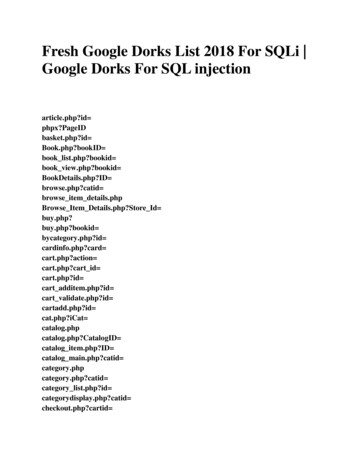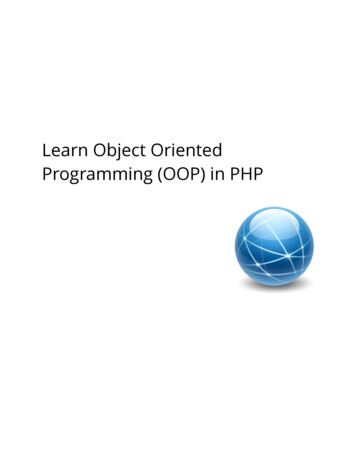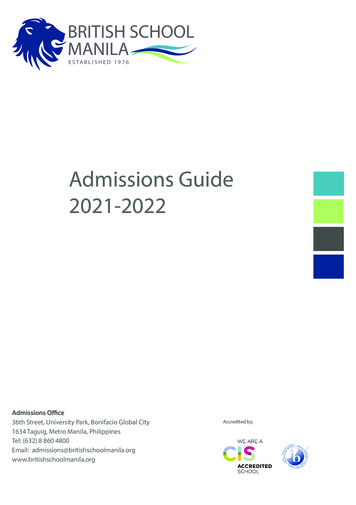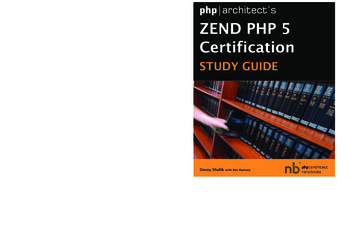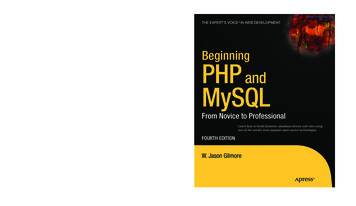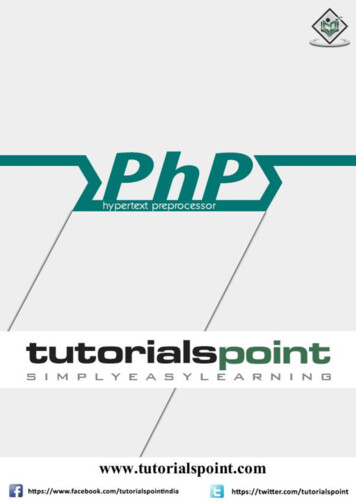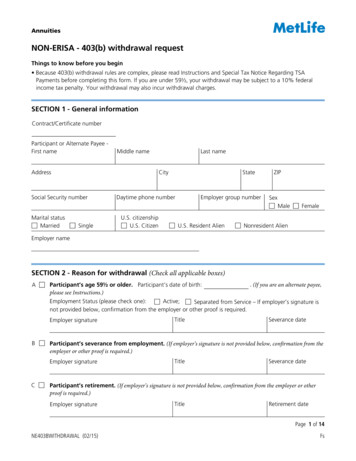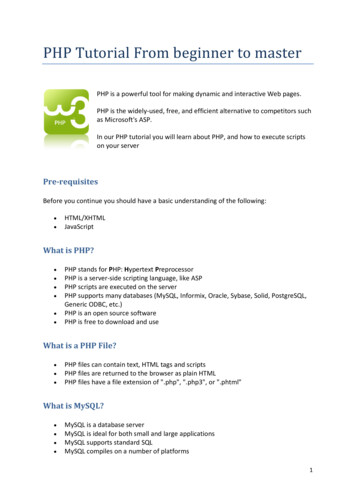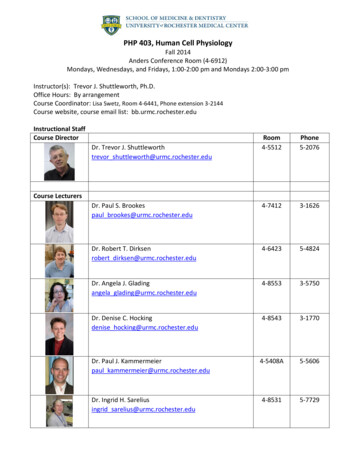
Transcription
PHP 403, Human Cell PhysiologyFall 2014Anders Conference Room (4‐6912)Mondays, Wednesdays, and Fridays, 1:00‐2:00 pm and Mondays 2:00‐3:00 pmInstructor(s): Trevor J. Shuttleworth, Ph.D.Office Hours: By arrangementCourse Coordinator: Lisa Swetz, Room 4‐6441, Phone extension 3‐2144Course website, course email list: bb.urmc.rochester.eduInstructional StaffCourse DirectorRoom4‐5512Phone5‐2076Dr. Paul S. Brookespaul brookes@urmc.rochester.edu4‐74123‐1626Dr. Robert T. Dirksenrobert dirksen@urmc.rochester.edu4‐64235‐4824Dr. Angela J. Gladingangela glading@urmc.rochester.edu4‐85533‐5750Dr. Denise C. Hockingdenise hocking@urmc.rochester.edu4‐85433‐1770Dr. Paul J. Kammermeierpaul kammermeier@urmc.rochester.edu4‐5408A5‐5606Dr. Ingrid H. Sareliusingrid sarelius@urmc.rochester.edu4‐85315‐7729Dr. Trevor J. Shuttleworthtrevor shuttleworth@urmc.rochester.eduCourse Lecturers
Dr. Trevor J. Shuttleworthtrevor shuttleworth@urmc.rochester.edu4‐55125‐2076Dr. Viktor Yarotskyyviktor yarotskyy@urmc.rochester.edu4‐54126‐3070Dr. David I. Yuledavid yule@urmc.rochester.edu4‐53143‐2154Course DescriptionThis course is aimed at providing an introduction to the fundamental principles of modern cellphysiology; the implications of cellular and molecular principles for the integrated physiologicalresponses of intact organs and tissues, in both healthy and diseased states, will be discussed. Thematerial will include basic concepts, principal research questions, and common methodologies ‐emphasis will be on a quantitative approach wherever possible. Course content will particularly focuson basic cellular physiology, including excitable cell physiology, and will emphasize intercellularinteractions and responses to their tissue and organ environment. Recent literature relevant to thematerial will be reviewed and analyzed during the course.Course Aims and ObjectivesThe purpose of this course is to introduce the main features of basic cellular physiology, withparticular relevance to those general areas that represent the specific focus of research being carriedout within the Department. As an introduction to the "experimental approach", the keymethodologies and technical breakthroughs that were critical in revealing the relevant essentialunderlying physiological processes will be described where relevant. In addition, where appropriate,the lectures will introduce the students to current or ongoing controversies with the aim of teachingan appreciation of analytical thought and debate that is the heart of scientific progress by means ofresearch. Critically, the emphasis throughout will be on teaching "understanding" rather than purememorization of facts.Course Policies and ExpectationsExpectations of the instructor: As a graduate level course, students will be expected to activelyparticipate in, and contribute to, discussion during the classes, to attempt to answer questions raisedby the instructor, and to ask questions themselves ‐ class participation is an essential part of thestudents’ learning experience. With regard to the “Paper” sessions, students are expected to haveread the assigned papers in advance of class and be prepared to discuss them.Student expectations from the instructor: Generally, any required reading material (e.g. for the“Paper” sessions) will be provided approximately one week before the relevant session. In additionto office hours, students can meet with the instructor by appointment to discuss material presented,exam preparation, and assessment performance.
Attendance and participation: As class participation is an integral component of the course, studentsare expected to attend all classes. Students who must miss a class are expected to notify theinstructor in advance and provide the reason for the planned absence.Exam preparation: Exams will be scheduled at the end of each of the three blocks as indicated in thecourse schedule (see attached). The exams will cover the material presented in the relevantpreceding teaching block, and will run for a maximum of two hours. Consistent with the course aimsand objectives, the exams will emphasize understanding of the material presented as far as possible.Consequently, there will be a minimum of "multiple‐choice" type of questions, and required answerswill typically be in the form of one or a few sentences.Makeup exams: Students are required to take exams as scheduled, and "makeup exams" will beoffered for absentees only when the student can document a legitimate conflict (e.g., attendance at ascientific conference, academic or professional interview), or in the case of illness. Students areasked to notify the instructor of any preplanned absence from an exam at least two weeks prior tothe exam.Regrade policy: Students may submit requests to reevaluate the assessment of credit for examquestions if they feel a significant mistake has legitimately been made in such assessment. Therelevant procedure is to submit a written request (e.g., via e‐mail) to the instructor who will schedulea meeting to discuss grading issues.Use of electronic devices in class: Use of laptop computers, electronic tablets, and recording devicesare allowed as long as they do not induce any disruption in the class. The Instructor retains theprerogative to limit or eliminate use of such devices if their operation interferes with the normalfunctioning of the classroom.Materials and Access: There is no required text for this course – many of the faculty will providecomprehensive handouts specific to the material they present. However, it is recommended thatstudents consider a textbook covering basic cell physiology. One such book is "Cellular Physiologyand Neurophysiology – 2nd Edition" by Mordecai P. Blaustein, Joseph P.Y. Kao, and Donald R.Matteson, published in the Mosby Physiology Monograph Series by Elsevier/Mosby. This text will beavailable at the Medical Center Book Store.Lecture outlines or notes, copies of the appropriate PowerPoint presentations, and relevant "ReadingPapers" etc., together with any other course materials, will be posted on the Blackboard website atthe appropriate time.Assignments and Grading Procedures: Assessments are based on performance in the three exams,with final letter grades assigned based on the distribution of scores in the class.Academic IntegrityAcademic integrity is a core value of the University of Rochester. Students who violate the Universityof Rochester University Policy on Academic Honesty are subject to disciplinary penalties, includingthe possibility of failure in the course and/or dismissal from the University. Since academicdishonesty harms the individual, other students, and the integrity of the University, policies on
academic dishonesty are strictly enforced. For further information on the University of RochesterPolicy on Academic Honesty, please visit the following ocs/Academic Honesty.pdfStudents in this course are expected to conduct themselves in an honest and ethical manner, as wellas to respect the intellectual work of others. Any writing assignment completed in lieu of anapproved absence must represent the student’s own work, with any ideas or text taken from othersbeing appropriated identified and cited.Accommodations for Students with DisabilitiesStudents needing academic adjustments or accommodations because of a documented disabilitymust contact the Disability Resource Coordinator for the school in which they are ordinators.html
PHP 403 Fall 2014 – Final ScheduleBLOCK 1: BASIC CELL PHYSIOLOGYDay/DateTimeLecture TitleInstructorWednesday1:00-2:00Transport across membranesShuttleworth1:00-2:00Regulated exocytosis of proteins IYule1:00-2:00Regulated exocytosis of proteins IIYule1:00-2:00Electrical gradients and ion channelsShuttleworth1:00-2:00Ion selectivity and permeation (plus patchYarotskyySeptember 3, 2014FridaySeptember 5, 2014MondaySeptember 8, 2014WednesdaySeptember 10, 2014FridaySeptember 12, 2014Mondayclamping technique)1:00-2:00Ion channel gatingYarotskyy2.00-3.00How to deal with current literature – a primerSarelius1:00-2:00Channels and diseases/ChannelopathiesYarotskyy1:00-2:00Carriers and PumpsShuttleworth1:00-2:00Epithelial transportShuttleworth2.00-3.00Paper 1Block I faculty1:00-2:00Anion channels and Cystic fibrosisShuttleworth1:00-2:00Mitochondrial Physiology and Cell EnergeticsBrookes1:00-2:00Mitochondrial Ion ChannelsBrookes1:00-3:00EXAM ISeptember 16, 2014WednesdaySeptember 17, 2014FridaySeptember 19, 2014MondaySeptember 22, 2014WednesdaySeptember 24, 2014FridaySeptember 26, 2014MondaySeptember 29, 2014FridayOctober 3, 2014
BLOCK 2:NERVE/MUSCLE EXCITABILITYMonday1:00-2:00Neuronal channelsKammermeier2:00-3:00Action potentialsKammermeier1:00-2:00Nerve conductionKammermeier1:00-2:00Neuromuscular junctionsKammermeier1:00-2:00Central synapsesKammermeier1:00-2:00Local anestheticsDirksen1:00-2:00Excitation-contraction couplingDirksen1:00-2:00Muscle contraction and myotoniaDirksen2:00-3:00Cardiac channels and action potentials IDirksen1:00-2:00Cardiac channels and action potentials IIDirksen1:00-2:00Paper 2 self-studyDirksen2.00-3.00Neuronal control of cardiac excitabilityDirksen1:00-2:00Cardiac EC coupling and contractilityDirksen1:00-3:00EXAM IIOctober 6, 2014WednesdayOctober 8, 2014FridayOctober 10, 2014MondayOctober 13, 2014WednesdayOctober 15, 2014FridayOctober 17, 2014MondayOctober 20, 2014WednesdayOctober 22, 2014FridayOctober 24, 2014MondayOctober 27, 2014WednesdayOctober 29, 2014FridayOctober 31, 2014
BLOCK 3:INTERCELLULAR INTERACTIONSMonday1:00-2:00November 3, 2014WednesdayExtracellular matrix (ECM) composition andHockingsynthesis1:00-2:00Integrins and ECM remodelingHocking1:00-2:00Integrating physical and chemical signalsfrom the ECMHocking1:00-2:00Cell structure and mechanicsGlading2.00-3.00Paper 3Block III faculty1:00-2:00Cell migrationGlading1:00-2:00Intercellular contact and tissueGladingNovember 5, 2014FridayNovember 7, 2014MondayNovember 10, 2014WednesdayNovember 12, 2014FridayNovember 14, 2014Mondaymorphogenesis1:00-2:00Cell barrier propertiesGlading1:00-2:00Endothelial cell responses andSareliusNovember 17, 2014WednesdayNovember 19, 2014Fridaymechanotransduction1:00-2:00November 21, 2014MondayRegulation of vascular smooth muscleSareliuscontractility1:00-2:00Myoendothelial communicationSarelius1:00-2:00NO CLASS1:00-2:00THANKSGIVING HOLIDAY1:00-2:00Integrated regulation of arteriolar functionSarelius2.00-3.00Paper 4Block III faculty1.00-2.00Regulation of permeabilitySarelius1:00-3:00EXAM IIINovember 24, 2014WednesdayNovember 26, 2014FridayNovember 28, 2014MondayDecember 1, 2014WednesdayDecember 3, 2014FridayDecember 5, 2014
Course website, course email list: bb.urmc.rochester.edu Instructional Staff Course Director Room Phone Dr. Trevor J. Shuttleworth trevor_shuttleworth@urmc.rochester.edu 4‐5512 5‐2076 Course Lecturers Dr. Paul S. Brookes paul_brookes@urmc.rochester.edu 4‐7412 3‐1626
